德國萊比錫歌劇院
Leipzig Opera
《崔斯坦與依索爾德》
Tristan und Isolde
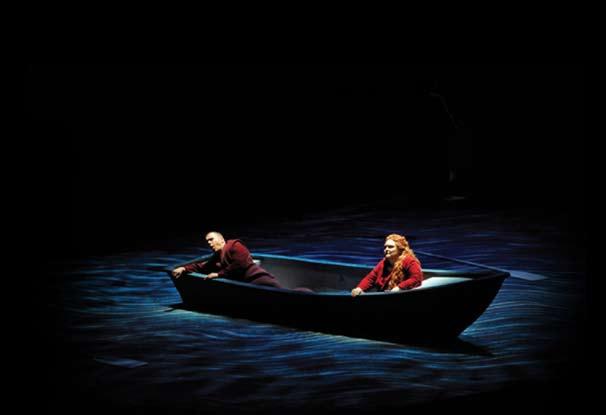
音樂及劇本 / 歌詞
華格納
Music and libretto by Richard Wagner
導演
威利.德克爾
Director Willy Decker
舞台及服裝設計
沃爾夫岡.古斯曼
Stage/Costume Designer Wolfgang Gussmann
指揮
艾塞.歌伯 Conductor Axel Kober
樂團
德國萊比錫布業大廳樂團 Orchestra Leipzig Gewandhaus Orchestra
三幕歌劇分別長約80分鐘、65分鐘及90分鐘。
Opera in three acts with approximate running time of 80 mins for Act I, 65 mins for Act II and 90 mins for Act III.

演員 Cast
崔斯坦
史提芬.文克
Tristan Stefan Vinke
依索爾德
珍妮花.威爾遜
Isolde Jennifer Wilson
布蘭格妮
蘇珊.麥克林
Brangaene Susan Maclean
馬可王
馬修.貝斯特
King Mark Matthew Best
庫威納爾
安東.科來米奇夫
Kurvenal Anton Keremidtchiev
梅洛特
尤根.庫爾特
Melot Jürgen Kurth
牧人/水手
蒂莫西.法倫
Herdsman/Seaman Timothy Fallon
舵手
安迪亞斯.大衛
Steersman Andreas David
中文字幕
Chinese Surtitles
字幕控制
蘇國雲(據環球唱片公司提供之版本改編)
So Kwok-wan (adapted from the version provided by Univeral Music Limited)
關玉瓊
Surtitles Operator Kwan Yuk-king, Yuki
謹此誌念於2010年4月辭世的黃奇智先生。黃先生自2003至2010年為藝術節翻譯多部歌劇及戲劇文本。
In memory of Mr Wong Kee-chee, translator of many festival’s opera and theatre productions from 2003-2010.
加料節目
華格納《崔斯坦與依索爾德》: 〈前奏曲〉及〈愛之死〉
20.3.2011(日)下午2:30 - 4:30
新加坡華格納協會創始人王雅蕙女士, 將介紹作品背景,幫助聽眾更全面的欣 賞這齣大作。
地點:商務印書館,尖沙咀圖書中心 英語主講。免費入場。
更多加料節目信息請參閱藝術節加料節目指南, 或瀏覽加料節目網站:www.hk.artsfestivalplus.org
Festival PLUS
Wagner’s Tristan und Isolde: Prelude & Liebestod
20.3.2011 (Sun) 2:30 - 4:30pm
Wang Yu-hui, founder of the Wagner Society of Singapore, will provide the necessary background for a full appreciation of this masterpiece.
Venue: Commercial Press, Tsimshastui Book Centre In English. Free admission.
Find out more about Festival PLUS in the Festival PLUS Booklet or at www.hk.artsfestivalplus.org

德國萊比錫歌劇院由歌劇院、芭蕾 舞團及音樂喜劇團組成,在歐洲的 悠久歷史僅次於威尼斯鳳凰劇院和 漢堡國家歌劇院。自1840年起, 萊比錫歌劇院的演出皆由萊比錫布 業大廳樂團演奏。
歌劇院成員大部份為年輕的國際演 唱家,常與知名藝術家合作,如狄 寶娜.波萊斯基、安札.席莉亞和 尼爾.舒科夫。演出曲目涵蓋巴羅 克時期至當代作品。
為慶祝華格納於2013年誕生二百 周年,歌劇院正籌備節目《萊比 錫雙指環》,除了演出音樂會版的 《尼伯龍根的指環》,還有葛魯克 的四部曲歌劇,以這兩個系列的演 出探視遠古至今的人類文明史。
The Leipzig Opera
The Leipzig Opera—consisting of the Opera, the Ballet and the Musical Comedy—is the third oldest musical theatre stage in Europe after Teatro La Fenice and the Hamburg State Opera. Since 1840 the Leipzig Gewandhaus Orchestra has played at every opera performance.
The ensemble of mostly young and international singers regularly performs with acclaimed artists like Deborah Polaski, Anja Silja and Neil Shicoff. The repertoire includes pieces from Baroque to present.
To celebrate Wagner’s anniversary in 2013, which will mark 200 years since his birth, the Leipzig Double Ring is being prepared. A concert version of The Ring of the Nibelung is being produced, along with a cycle of four operas by Christoph Willibald Gluck. Both cycles explore primeval times to the modern future, the full history of civilized humanity.
音樂總監 伍爾夫.舒爾瑪
General Music Director Ulf Schirmer
舞台總監
彼得.康維茲殊尼 Stage Director Peter Konwitschny
芭蕾舞總監
Ballet Director
馬里奧.施羅德
Mario Schröder
德國萊比錫布業大廳樂團
The Leipzig Gewandhaus Orchestra
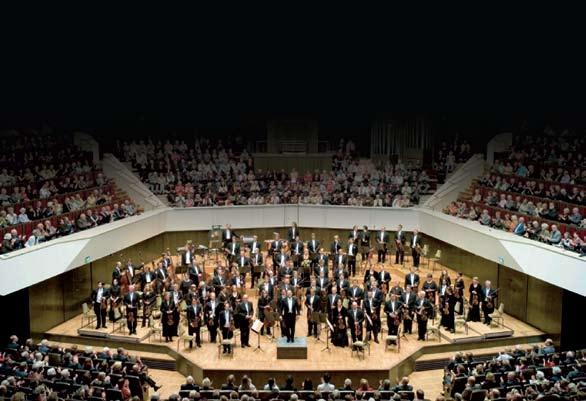
德國萊比錫布業大廳樂團是世上 歷史最悠久的民間音樂會樂團。
1743年,16位商人創辦了音樂 協會「華麗音樂會」;1781年 以布業商人會所「布業大廳」為 基地,遂易名為「布業大廳樂團」; 1884年,樂團遷往新音樂廳。這座 新音樂廳通過售股籌錢建造,1944 在空襲中被毁;1981年,位於奧古 斯都廣場的新布業大廳落成啟用。
德國萊比錫布業大廳樂團對交響樂 傳統的貢獻始終傲視同儕:例如貝 多芬在生的時候,這裏演出了他所 有交響曲,1970年代更創全球先河, 首次為觀眾呈獻布魯赫納交響曲全 集和蕭斯達高維契交響曲全集。
The Leipzig Gewandhaus Orchestra (LGO) is the oldest civic concert orchestra in the world. It had its origins in the concert society called the “Grand Concert” founded by 16 merchants in 1743. Following its move into the meeting house of the cloth merchants (the Gewandhaus) in 1781, the ensemble was named the Gewandhaus Orchestra. In 1884, the orchestra moved into a new concert hall that had been built through the sale of endowment shares. This was destroyed during the air raids of 1944. In 1981, a new Gewandhaus was opened on Augustusplatz.
Few other orchestras have contributed as much to the development of the symphonic musical tradition does as the Gewandhaus
樂團曲目極廣,演出也非常頻 繁。萊比錫布業大廳樂團集多個 樂團於一身,包括音樂會樂團、 萊比錫歌劇院樂團及室樂團, 後者與舉世知名的聖多馬大教堂聖 多馬少年合唱團演出清唱劇。樂團 每年在布業大廳、歌劇院、聖多馬 大教堂和巡迴各地的演出合計超 過二百場。樂團既是萊比錫音樂 活動的重心,也是最重要的音樂 大使。樂團歷年來讚譽不絕,於 2009年倫敦新年音樂會之演出,獲 《星期日時報》選為過去十年15項 最傑出古典音樂盛事之一;同年又 獲選為「本世紀德國品牌」。
孟德爾頌、尼基什、福爾特萬 格勒、華爾特等都曾任萊比錫布業 大廳樂團總監。比奧斯達1998年 接替馬素爾,出任樂團第18任音樂 總監;沙爾則由2005年9月起出任 第19任音樂總監。
Orchestra. For example, it performed all of Beethoven’s symphonies during the composer’s lifetime. The orchestra also presented the world’s first complete Bruckner cycle as well as the first Shostakovich cycle during the 1970s.
The orchestra boasts an exceptionally wide repertoire and an unusually large number of performances. This is due in part to its multiple functions as a concert orchestra, an opera orchestra at the Leipzig Opera, and a chamber orchestra which performs cantatas with the world-famous St Thomas Boys Choir at St Thomas Church. With more than 200 performances each year in these three venues and on tour, the Gewandhaus Orchestra is the musical heart of the City of Leipzig and its most important musical ambassador. Throughout its history it has received numerous accolades and recently the Sunday Times named its New Year’s Day concert in London 2009 as one of the 15 Best Classical Events of the Decade. It was also named German Brand of the Century in 2009.
Felix Mendelssohn, Arthur Nikisch, Wilhelm Furtwängler and Bruno Walter number among the most distinguished Gewandhaus Music Directors. Herbert Blomstedt, who succeeded Kurt Masur in 1998, was the orchestra’s 18th Music Director. Since September 2005, Riccardo Chailly has held the post of 19th Gewandhaus Music Director.
天大罪作出補償,方肯踏上康沃 爾國土,崔斯坦這時才勉強答應 相見。依索爾德深信,惟有與崔斯 坦同歸於盡,才能讓她擺脫愛恨 交煎。滿以為一劑毒藥,就可消 除兩人之間的一切障礙,不料布蘭 格妮為怕女主人有什麼不測,把毒 藥換成了催情藥酒。依索爾德與崔 斯坦遂陷入熱戀,互訴衷情,連她 行將下嫁的馬可王駕到,兩人也渾 然不覺。
if Tristan first atones for an unforgivable sin, is he reluctantly prepared to meet her. Isolde believes that only both their deaths can free her from her conflicting feelings. All barriers between the two are broken down by what is supposed to be a death potion but which Brangaene has in fact substituted with a love potion out of fear for her mistress. Tristan and Isolde ecstatically confess their love for one another, almost oblivious to the arrival of Isolde’s future spouse, King Mark.
— Interval —
第二幕
依索爾德服侍在馬可王身邊,無奈 與崔斯坦分開,卻乘國王與隨從狩 獵之隙,與他相約幽會。依索爾德 心急火燎的等着情人赴約,布蘭格 妮勸女主人提防梅洛特,他是國王 心腹,會唆擺因妒成恨的國王, 對崔斯坦不利,但依索爾德不以 為然。她恨不得馬上見到情郎, 便把蠟燭吹滅,示意崔斯坦放心 前來,布蘭格妮會在門外看守。 兩人相會,意到情濃,越說越興奮, 一面詛咒白天如何從中作梗,不讓 他們見面;一面禮讚黑夜和死亡怎 樣撮合幫忙,認之為愛的使者。快 要天亮,兩人還卿卿我我,顧不得 布蘭格妮再三提醒。就在兩人說到 興起,馬可王由梅洛特領路,突然 出現。國王一再質問崔斯坦為何違 背信約,崔斯坦緘口不言,令國王 莫名所以。崔斯坦錯愕之下,無法 為自己辯解,只感萬般無奈,更渴 望逃到「夜之神奇國度」,依索爾 德並未察覺他話裏有因,決意追隨
Act II
The lovers have been separated as a result of Isolde’s life at King Mark’s side. The two have arranged a secret rendezvous since Mark has gone hunting with his entourage. Isolde awaits her lover impatiently. In vain, Brangaene warns Isolde about Melot, a member of the King’s entourage, convinced he is party to a jealous intrigue against Tristan. Full of longing, Isolde extinguishes the candles, the agreed signal that the way is clear for Tristan. Brangaene will keep watch outside. In ever more glowing terms, the two lovers curse the spiteful and deceptive day that has divided them, and emphatically praise the night and death as friends of their love. They pay no attention to the ever more urgent calls of Brangaene announcing the imminent dawning of the next day. The increasingly ecstatic dialogue is abruptly ended, however, when suddenly Mark appears, preceded by Melot. The deeply wounded King asks more and more insistently but in vain the reason, which he cannot understand at all, for his best friend’s breach of trust. The shaken Tristan,
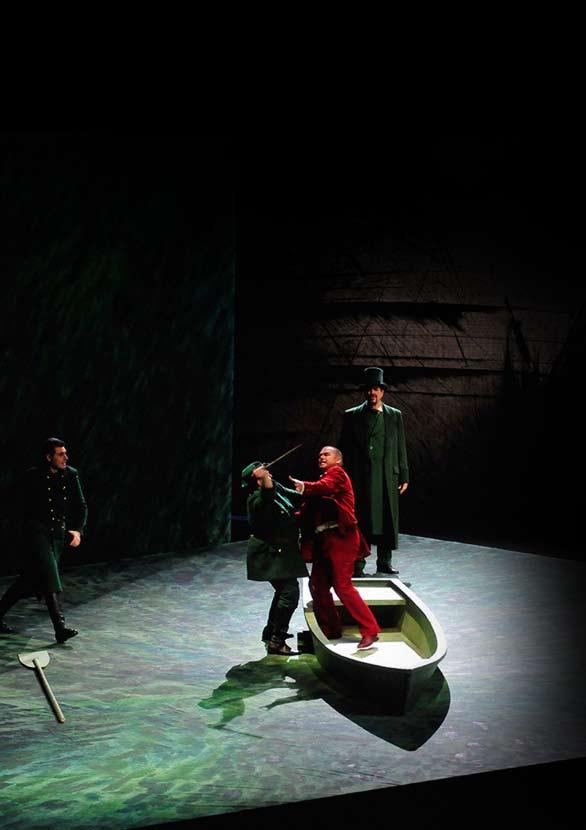
左右。梅洛特野心勃勃,看不過眼, 怒向崔斯坦襲擊。崔斯坦把武器奪 過來,卻令自己再受重傷。

— 休息 —
第三幕
庫威納爾把奄奄一息的崔斯坦帶回 老家卡里奧城堡療傷,再叫依索爾 德隨後而至。一個牧人守着,若看 見依索爾德所坐的船歸來便發出 訊號。不省人事的崔斯坦終於蘇醒 過來,庫威納爾情緒激動,告訴他 如今已身在家鄉,已叫了惟一能救 治他的醫生到來。但崔斯坦心知 肚明,只要依索爾德尚在人間, 他就不會貿然跨過死亡的門檻。 他等着與愛人殉情,此刻內心折騰 不已,往事在眼前浮現,自忖一 生總能從苦難和死亡中脫身出來, 逢凶化吉。他詛咒催情之藥,反越 說越令自己無法抑制對依索爾德的 熱情。就在此時,牧羊人發訊示意 有船駛近。依索爾德抵達時,卻來 遲一步,崔斯坦已離開人世。不久 有另一隻船前來,原來是馬可王聽 了布蘭格妮換藥的一番話,尾隨 而至,打算寬恕二人。庫威納爾 誤以為來者不善,橫加阻擋。他怒 不可遏,把梅洛特擊倒地上,但 自己也受了致命傷,倒斃在崔斯坦 腳下。自從愛人死後,依索爾德 對周遭的事已視而不見。她深信在 陰間會與情人永遠相聚,也隨之 歸天去了。
who is unable to explain himself, just helplessly yearns even more for the “magic realm of the night”, and Isolde wants to follow him there obliviously. This is too much for the ambitious Melot. Furiously, he attacks Tristan. But the latter seizes the weapon from him and inflicts a fatal wound upon himself.
— Interval —
Act III
Kurvenal has brought the dying Tristan home to Careol and sent Isolde after him. A shepherd keeps watch to signal to the ship that is bringing Isolde to Tristan. Tristan awakens from an unconscious haze. Emotional, Kurvenal explains to him that he is at home and the only doctor who could help him has been called. But Tristan knows better: only the knowledge that Isolde is still alive keeps him from death’s door. Tormented as he waits for his lover so that they can die together, Tristan’s life that has always delivered him from suffering and death, flashes before him. He curses the love potion and works himself up into more and more ardent outbursts of yearning for Isolde. At this moment, the signal of the shepherd sounds, announcing the arrival of a ship. But when Tristan’s lover finally arrives, she is too late: he dies. Then the arrival of a second ship is heralded: King Mark, whom Brangaene had informed about “the secret potion”, has followed Isolde to forgive them. Kurvenal, misinterpreting the situation, stands in his way. Furiously, Kurvenal knocks Melot to the floor, and both are fatally wounded. Isolde has been oblivious to everything since the death of her lover. In the certainty of being united with Tristan for ever, she too dies.
繞着疑惑不定、方向不明、絕望不 幸而展開。瞭解其奧秘的第一步, 是要意識到《崔斯坦》含有兩重 真實。華格納把我們領進發生於數 個層面的事件當中,正是藉助如此 新奇的手法,他打開了通向現代 世紀的大門。他把真實置於相對 地位,從而毀滅了傳統的參照點、
顛覆了常規的確定性 無論是 音樂和聲上、舞台調度上,還是在 哲學和心理的層次上,無不如此。
第二幕開始,布蘭格妮和依索爾德 在談話,這兩重真實的原則就特別 明顯:布蘭格妮感到有危險臨近, 察覺出誰在嫉妒、誰在弄陰謀; 可是依索爾德眼中只有友情和愛。
在依索爾德的內心世界裏,外界或 客觀世界的狩獵號角,聽起來就像 「潺潺的溪水」。兩個女人聽到同 一種聲音,但從各自的真實心境 出發,聽出的內容卻有不同,甚至 南轅北轍。依索爾德和布蘭格妮 永不會同意對方,那聲音到底是 「號角還是溪水」,因為她們活在 兩個不同世界:一個是有愛神眷顧 的世界,另一個是未有愛滋潤的 世界。這兩者之差距,正標示出作 品的主要分界線。馬可王問崔斯坦 為何背叛,要他道出背後「深不 可測的神秘原因」,崔斯坦答道: 「你的問題,永遠無法找到答案」 馬可若要真正明白崔斯坦的回答, 就得從自己的世界走到到崔斯坦 的世界。
漢斯.邁耶稱這個難題為「風馬 不接」,彼此都聽不進對方的話。
這個歌劇每一句對白,都可作如 是觀,每個對話的人都來自不同
am I?” Tristan revolves around uncertainty, disorientation and forlornness. A first step towards understanding its mystery is realising that there are two realities in Tristan. Wagner leads us into events occurring at several levels — that is what is so new — and thus he opens the door to the modern age. By relativising reality, he destroys the traditional points of reference, the conventional certainties — in the musical harmonic, theatrical, philosophical and psychological senses.
When Brangaene and Isolde speak to each other at the beginning of the second act, this principle of the two realities becomes particularly clear: Brangaene senses danger, recognises envy and conspiracy, yet Isolde sees only friendship and love. The sound of the hunting horns in the objective or external reality sounds like “gently rippling waves of the stream” in Isolde’s internal reality. Both women hear the same thing but from their respective different internal realities, they perceive it differently and identify it in diametrically opposed ways. Isolde and Brangaene will never agree upon the question of “horns or stream” because they live in two different worlds: one in the world of someone who is in love, the other in the world of someone who is not in love. It is between these worlds that the main demarcation line of the work runs. When Mark asks Tristan about the “unfathomably deep mysterious cause” of his betrayal, Tristan replies, “What you would know, that you can never learn.” In order to really understand the response, Mark would have to switch from his own universe to Tristan’s universe.
This dilemma, which Hans Mayer calls “talking at cross purposes”, with neither party getting through to the other, can be applied to every
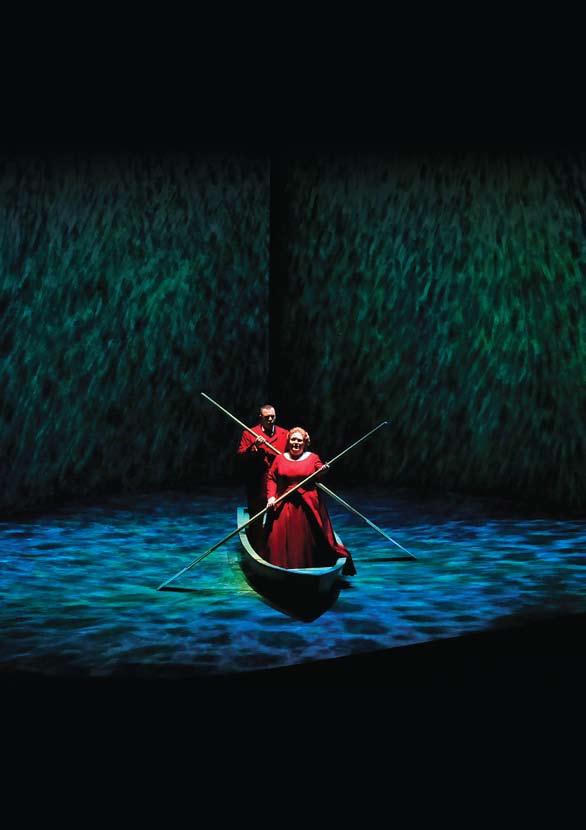
星球。但有一處例外:崔斯坦和 依索爾德在第二幕有一場重要的對 手戲,就並非「風馬不接」。他們 置身於同一個宇宙:愛的宇宙, 他們的話出自同一種心思。這種使 角色的觀感和意識完全相對化的 處理手法,正是《崔斯坦》新穎 之處,完全顛覆了觀衆的固有的觀 念和期望。依索爾德說「我們在 哪兒」,這句問話從第一幕開始, 越到後來越切中要害。兩重真實 之間的界線不僅完全與角色擦身 而過,更着着實實貫穿到他們 身上。常常是口在說某些話,心靈 則在另一個截然不同的層次。
在第三幕,兩重真實的界線在崔 斯坦身上徹底消失。「我醒來的 地方,我不存在;而我曾到的 所在,我無法相告。」他如被囚 獲釋一樣在兩重現實之間遊走: 「夜把我驅逐到白天」。兩重真實 的觀念延伸出去,可適用於許多互 為關聯的對立上,如愛與不愛、 生與死、夢與醒,日夜以至黑暗。
對崔斯坦而言,甚至有對與錯的真 實之分:他喝下愛的藥酒後,以往 發生的一切仿似夢中假象,如今他 醒過來,見到他那愛的真實。這真 實在黑暗降臨、夜晚開始之際 出現 這時什麼也再看不到, 只能依靠感受,萬物再無名字: 「不可名狀地籠罩在愛情之中」。
dialogue in the opera with only one exception — the interlocutors are on different planets. It is only Tristan and Isolde, in the significant scene in the second act, who are not talking at cross purposes. They find themselves in the same universe, the universe of their love — their words stem from the same consciousness. This total relativisation of perception and consciousness is what is so new about Tristan, what pulls the rug from under the feet of the characters and of the audience. Isolde’s words “Where are we?” from the first act remain potent, indeed become even more pertinent, the longer the opera goes on. Not only does the line between the realities completely pass the characters by, but it literally intersects them. Words are often spoken on one level although the soul is on a completely different level.
In the third act, the line between the realities has literally dissipated in Tristan himself: “Where I awoke, there I was not, but where I was I cannot tell you.” He moves back and forth between the realities as if he has become unleashed: “Night casts me out into Day”. This concept of the two realities branches out and is applied to many associative opposites: love and not love, life and death, dream and waking, day and night, light and dark. For Tristan, there is even a right and wrong reality: when he has drunk the love potion, everything that has happened so far seems to him to be dreamlike deception, from which he has awoken to the reality of his love. This reality sets in where darkness falls, where night begins — where nothing can be seen any more, only felt, where nothing is given a name: “namelessly enveloped in love”.
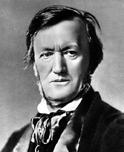
華格納
Richard Wagner (1813-1883)
華格納生於艱險時代。1813年 5月22日出生於萊比錫,其後幾 個月,城外集結著大批軍隊,拿 破崙時代幾場重大戰役一觸即 發。翌年,守寡的母親嫁給了華 格納家的故交,路德維蓋耶。
蓋耶是一名出色的演員,蒙他 薰陶,華格納自幼在一個充滿戲 劇氣氛的家庭中成長。由於這個 緣故,華格納是通過戲劇和文學 而走向音樂的,所以後來他的藝 術視野和戲劇的境界密不可分。
華格納少時已決心集戲劇家和作曲 家、作詞家和音樂家於一身。他在 鄉鎮歌劇團當指揮,奮鬥多年, 又在巴黎當過自由音樂家,終於以 仿效法國式大歌劇的《黎恩濟》 一鳴驚人。因為該劇大受歡迎,
他受聘於得德累斯頓宮廷歌劇院為音 樂總監,並推出首批表達他真實心聲 的歌劇。可是後來他參與左翼活動, 在1849年席捲德累斯頓的革命運動 中失敗後,他被迫流亡瑞士。
華格納在瑞士流亡期間,逐漸產生 了對歌劇進行徹底改革的想法, 要真正將音樂和戲劇融為一體, 樂隊也要更充分發揮交響樂效果。
他開始把想法付諸實踐,創作不 朽的歌劇四部曲《尼伯龍根的
Richard Wagner was born in dangerous times. Outside his native city of Leipzig, massive armies readied themselves for some of the decisive battles of the Napoleonic era took place in the months after little Richard’s birth on May 22, 1813. The next year, his mother, who had become a widow, married a family friend and talented actor named Ludwig Geyer. Thanks to Geyer, Wagner grew up in a household dominated by theatre. His journey toward music was through the world of theatre and literature. Ultimately, Wagner’s artistic vision became inseparable from the theatrical world of heightened reality.
Even as a teenager, Wagner became determined to combine the roles of dramatist and composer, librettist and musician. Years of struggle as a conductor with provincial opera companies and as a freelance artist in Paris were followed by his first great public breakthrough with Rienzi, a work modelled on French grand opera. Its success landed him a job as music director with the Dresden Court Opera, where Wagner introduced the first operas that represent his authentic voice. But his involvement as a leftist in the failed Revolution that swept through Dresden in 1849 forced him into political exile in Switzerland.
It was during his Swiss exile that Wagner evolved his ideas for a radical reform of opera into a true synthesis of music and drama, calling for a more
指環》。但在1857年,他暫時擱置 《指環》,專心創作《崔斯坦與依索 爾德》。該劇作於瑞士和威尼斯, 完成於1859年。直到1862年政府頒 下特赦,華格納才返回故鄉。
1864年,年輕的巴伐利亞國王路 德維希二世登基,馬上成為華格 納最重要的保護人,大力支持他 這部開天闢地的傑作《崔斯坦與 依索爾德》,使之終於在1865年 6月於慕尼黑首演。華格納的事業 和生平仍然坎坷曲折,儘管他在巴 伐利亞的小鎮拜羅伊特建成了自 己的劇院。這個劇院的理念主要是 讓華格納全面掌控歌劇製作的各個 方面。劇院在1876年啟用,首演 了《尼伯龍根的指環》四部曲。
華格納最後一部歌劇《帕西法爾》 亦於1882年在這個劇院首演。 翌年2月他在威尼斯逝世。
很少有作曲家像華格納那樣惹人 爭論,能令愛者欲其生,恨者 欲其死。但他的音樂觀念影響 深遠,是無可辯駁的事實,特別 是他在《崔斯坦》歌劇中運用了 大膽創新的音樂語言,影響了一 代又一代的作曲家。
symphonic use of the orchestra. He began putting these ideas into practice in the monumental cycle of four operas, The Ring of the Nibelung. But in 1857 he put The Ring aside temporarily to devote his attention to Tristan und Isolde, which he composed in Switzerland and Venice and completed in 1859. Amnesty was granted in 1862, allowing the composer to return to German soil.
The young King Ludwig II of Bavaria ascended the throne in 1864 and immediately became a powerful new patron. Ludwig made it possible for the groundbreaking Tristan to receive its premiere at last, which took place in Munich in June 1865. Wagner’s career and personal life continued to be stormy, though he succeeded in having his own theatre built in the small Bavarian town of Bayreuth. The concept behind Bayreuth was to give Wagner control over all aspects of operatic production, and the theatre was inaugurated in 1876 with the first-ever Ring cycle. Wagner’s final opera, Parsifal, premiered there in 1882. In February 1883 he died in Venice.
There are few, if any, composers who have proved as controversial as Wagner, inspiring intense reactions of admiration and loathing alike. But what is indisputable is the profound influence that Wagner’s musical ideas — above all, the daring new language he developed for Tristan — have wielded on generations of composers.
沃爾夫岡.古斯曼
Wolfgang Gussmann 舞台及服裝設計
Stage / Costume Designer
沃爾夫岡.古斯曼畢業後,當過舞台佈景畫師,後來給舞台導演兼設計師 赫伯特韋尼克聘為私人助手。他協助過二十多個製作之後,獨立擔任佈景 和服裝設計。1979年於達姆施塔特歌劇院開始獨立受雇。

此後他以自由身份從事此兩類設計,最初幾乎都是與威利.德克爾共 事,然後從1992年起也與安德烈亞斯.霍莫基合作。他的職業生涯大多是跟這兩位知 名導演一起度過的。不過,他也協助過其他導演,如哈里.庫費爾、約翰尼斯.沙夫、 雷托.歷克等。
他作品豐富,曾為各歌劇院及音樂節製作超過150齣歌劇,如為維也納國家歌劇院和巴伐 利亞國家歌劇院,以及魯爾藝術節和薩爾斯堡音樂節。他的佈景及服裝設計也見於北美、 歐洲和日本。
由於他對法國文化生活有著積極的貢獻,他於2002年被授予法國的文學藝術騎士勳章。
After graduation, Gussmann worked as a painter of theatre sets before being engaged by stage director and designer Herbert Wernicke as his personal assistant. He worked on more than 20 productions as an assistant before becoming a set / costume designer in his own right. His first independent engagement was in 1979 for the opera house in Darmstadt.
Since then he has been working as a freelance set and costume designer almost exclusively with Willy Decker at first, and then also with Andreas Homoki from 1992. Collaborations with these two renowned stage directors have dominated his professional life. However, there were also productions with other stage directors including Harry Kupfer, Johannes Schaaf and Reto Nickler.
His output has been prolific, over 150 productions for numerous opera houses and festivals such as: the Vienna State Opera and Bavarian State Opera; the Ruhrtriennale and the Salzburg Festivals. Many adaptations and remakes of his sets and costumes have been seen throughout Europe, North America and Japan.
He was awarded the order of Chevalier des Arts et des Lettres in 2002, honouring his contributions to the cultural life of France.
史提芬.文克
Stefan Vinke
崔斯坦
Tristan
2003年,德國裔的文克在曼咸國家劇院飾演崔斯坦,嶄露頭角,繼而成為 當代極受矚目的英雄男高音。近幾個樂季,他在威尼斯鳳凰劇院和科隆歌
劇院演出《齊格菲》,在日內瓦大劇院和費城歌劇院演出《酒神》,又在史 圖加歌劇院、萊比錫歌劇院和曼咸國家劇院演出《羅恩格林》。2010年底 在巴黎巴士底歌劇院新製作的歌劇《阿里阿德涅在納克索斯島上》中,首演酒神一角。

他經常扮演的人物有唐懷瑟、齊格蒙德、艾力克、荷西、安德萊.謝尼爾、卡尼歐和荷夫曼。
Since his debut as Tristan in 2003 at the National Theatre Mannheim, Germany, native German Vinke has established a career as one of the most noted heroic tenors of our time. In recent seasons he has performed Siegfried at Teatro La Fenice and Cologne Opera, Bacchus at the Grand Theatre de Geneve and Philadelphia Opera, and Lohengrin at the Stuttgart State Opera, Leipzig Opera and National Theatre Mannheim. At the end of 2010 he gave his debut at Opera Bastille as Bacchus in a new production of Ariadne of Naxos His repertoire also includes Tannhäuser, Siegmund, Erik as well as Don Jose, Andrea Chenier, Canio and Hoffmann.
珍妮花.威爾遜
Jennifer Wilson
Isolde
2002年,珍妮花.威爾遜於康涅狄格歌劇院首演《杜蘭朵》女主角,從 此當上世界頂尖戲劇女高音。她隨即與芝加哥歌劇院合作,首演華格納 《女武神》的海姆維茲,並在歐洲首演於阿姆斯特丹音樂廳,演唱舒爾 霍夫的歌劇《火焰》。2006至2007的樂季,她與指揮家梅達開始一連串

合作,陸續在西班牙瓦倫西亞的藝術皇宮歌劇院、佛羅倫斯的五月歌劇院演出全新製作的 《女武神》、《齊格菲》和《諸神的黃昏》,以其完整演繹華格納的歌劇巨制《尼伯龍根 指環》而飲譽歌劇界。
此外,她是個多才多藝的演唱會音樂家,曲目眾多,包括史特勞斯的《最後四首樂曲》、 貝多芬的《第九交響曲》和威爾第的《安魂曲》。
Wilson debuted in 2002 as Turandot with the Connecticut Opera, successfully establishing herself as one of the world’s leading dramatic sopranos. Soon after, she debuted with the Lyric Opera of Chicago as Helmwige in Die Walkuere and made her first European appearance in Schulhoff’s Die Flammen at Amsterdam’s Concertgebouw. In the 2006/2007 season, she began a multi-season collaboration with Zubin Mehta, at the Palau de les Arts, Valencia and the Teatro del Maggio Musicale in Florence as she embarked on new productions of Die Walküre, Siegfried and Die Götterdämmerung which culminated last season with her highly-acclaimed first complete Ring Cycle performance.
She is also a versatile concert artist whose extensive repertoire includes Richard Strauss’ Four Last Songs, Beethoven’s Symphony No 9 and Verdi’s Requiem.
安東.科來米奇夫
Anton Keremidtchiev 庫威納爾 Kurvenal
科來米奇夫於保加利亞首都索非亞的國家音樂院考獲文憑,成績優異。
他繼續在羅馬跟隨基斯杜夫學習聲樂。並在意大利佩薩羅的羅西尼學院參 加大師班,受業於阿貝托.澤達門下。

他先在索非亞國家歌劇院擔任獨唱男低音,也客席演出於其他歌劇團, 如特里雅斯特的威爾第劇院。他在克洛德.泰奧拉斯的指導下,轉向男中音發展,以演唱 威爾第《奧瑟羅》的雅戈而一舉成名。2008年,他在奧地利威爾茨舉辦的華格納音樂節上 扮演克林索(《帕西浮》)。2009年3月,他在萊比錫歌劇院首演庫威納爾,大獲成功。同 年秋天,他在赫爾辛基國家歌劇院飾演《卡門》裏的鬥牛士艾斯卡米路。
Keremidtchiev obtained a diploma with distinction at the Bulgarian State Conservatory in Sofia and continued his vocal training with Boris Christoff in Rome. He also took masterclasses at the Accademia Rossiniana in Pesaro under Professor Alberto Zedda.
He began as a bass singer performing as a soloist at the Sofia State Opera and in guest roles for several companies including the Teatro Verdi Trieste. Under the direction of Claude Thiolas, he moved to the baritone-repertory and made his successful debut with Jago. In 2008 he portrayed Klinsgor at the Richard Wagner Festival in Wels, Austria. In March 2009 he made his highly acclaimed debut as Kurvenal at the Leipzig Opera and in autumn 2009 he portrayed Escamillo at the Helsinki National Opera.
尤根.庫爾特
Jürgen Kurth
梅洛特 Melot
尤根.庫爾特在萊比錫和柏林的音樂大學修讀歌唱專業。他的第一份工作 是1977年在東德的格拉擔任抒情男中音。1980年,他加入萊比錫歌劇院。

1988年他獲頒萊比錫市藝術獎,並獲功勛歌唱家名銜。其常演角色超過 八十個,包括沃夫蘭、艾瑪維瓦伯爵和唐阿方索。庫爾特演唱過多部當代 歌劇,如特里貝曼的《白癡》(首演)。他也參與演唱萊比錫布業大廳和萊比錫電台交響 樂團的音樂會。此外,他還在萊比錫音樂與戲劇大學任教授。
Kurth studied singing at the University of Music in Leipzig and in Berlin. In 1977, he took up his first engagement as lyric baritone in Gera and has been a member of the ensemble at the Leipzig Opera since 1980.
He was awarded the Art Prize of the City of Leipzig in 1988 and received the title of distinguished singer (Kammersänger). He has a repertoire of 80 parts including Wolfram, Count Almaviva and Don Alfonso. Kurth has had many parts in contemporary operas, for instance, in The Idiot by Treibmann (premiere). He has performed as a concert singer with the Gewandhaus Orchestra and the Radio Symphony Orchestras of Leipzig and is a Professor at the University of Music and Theatre in Leipzig.
蒂莫西.法倫
Timothy Fallon
牧人 / 水手
Herdsman / Seaman
蒂莫西.法倫生於紐約州賓漢頓市,於新澤西普林斯頓的西敏寺合唱音樂 學院獲學士學位,於賓漢頓大學獲碩士學位。
初出道時,他在朱麗亞音樂學院的歌劇中心演唱奧芬巴赫《地獄中的奧 菲爾》,飾演奧菲爾一角,並在莫扎特的《冒牌女園丁》中扮演貝爾福。
他還首演了美國作曲家洛厄爾 ·李伯曼的《寂寞芳心》。

法倫是萊比錫歌劇院的男高音, 他主要演唱羅西尼歌劇的重要角色,如艾瑪維瓦、唐納西斯科、李彬斯科夫伯爵;還有其 他如貝爾蒙特和尼莫連奴。法倫在國際的夏日音樂節上演出過,包括西部音樂學院音樂 節,並榮獲友誼獎和鼓勵獎。
Fallon is a native of Binghamton, New York, and holds a Bachelor of Arts degree from Westminster Choir College in Princeton, New Jersey; and a Master’s in Opera from Binghamton University, New York.
Early in his career he performed with the Juilliard Opera Center as Orpheus in Offenbach’s Orphée aux enfer and Belfiore in Mozart’s La finta giardiniera. He also performed in the world premiere of Lowell Liebermann’s Miss Lonely Hearts. As a tenor of the ensemble at the Leipzig Opera, he not only performs the important Rossini roles such as Almaviva, Don Narcisco and Conte di Libenskof, but also does other roles like Belmonte and Nemorino. Fallon performs at international summer festivals including the Music Academy of the West, where he received a Fellowship Award and an Encouragement Award.
安迪亞斯.大衛
Andreas David 舵手 Steersman
安迪亞斯.大衛畢業於萊比錫的孟德爾頌音樂大學。1979至1984年師事姬 斯塔.諾瓦克。他通過國家考試,進入荷利地區劇院。1983年贏得國際德 伏扎克比賽。1985年在東德城市格拉舉行的東德歌劇演唱比賽中,獲得第 二獎及韓德爾獎。

1988年,他成為了柏林喜歌劇院的永久成員,1995年轉到呂貝克劇院,1998年加入萊比 錫歌劇院。他也常有獨唱,如在漢伯汀克的《韓賽兒與葛蕾特》中飾演父親,又在葛特利 的《兩個守財奴》中扮演阿里一角。
David studied at the Felix Mendelssohn Bartholdy University of Music in Leipzig under Christa Nowak from 1979 to 1984. Following his state examination, he was taken on at the Halle regional theatre. He won the International Antonin Dvořák Competition in 1983, and the second prize and Handel Prize at the GDR national opera singing competition in Gera, 1985.
He became a permanent member of the Komicshe Oper Berlin in 1988. He moved to the Lübeck Theatre in 1995 and then in 1998 joined the ensemble of the Leipzig Opera. He often sings solo parts such as the father in Humperdinck’s Hansel and Gretel or Ali in Grétry’s Les Deux Avares at the Musical Comedy.
場刊中譯:昌明
Leipzig Gewandhaus Orchestra
第一小提琴 First Violin
Christian Funke 1st concertmaster
Frank-Michael Erben 1st concertmaster
Conrad Suske
assistant 1st concertmaster
Andreas Seidel assistant 1st concertmaster
Veronika Starke
Yun-Jin Cho
Sara Astore
Wolfram Fischer
Hans-Rainer Jung
Susanne Hallmann
Dorothea Vogel
Stefanie Laucke
Anna Schuberth-Meister
Chiara Astore
Maria Held
Irene Serban
Julia Suslov
Anne Kühne
第二小提琴 Second Violin
Peter Gerlach 1st concertmaster
Markus Pinquart
Katharina Schumann
Karl Heinrich Niebuhr
Ludolf Kähler
Werner Janek
Beate Roth
Dietrich Reinhold
Kathrin Pantzier
Edwin Ilg
Tobias Haupt
Alexander Butz
Lydia Dobler
Nemanja Bugarcic
Kana Akasaka
Dorothee Volz
中提琴 Viola
Gareth Lubbe solo
Peter Borck
Ruth Bernewitz
Norbert Tunze
Konrad Lepetit
Katharina Dargel
Matthias Weise
Immo Schaar
Claudis Bussian
Anne Wiechmann-Milatz
Alexander Uhle
Viktor Bátki
Soram Yoo
大提琴 Cello
Jürnjakob Timm 1st solo
Veronika Wilhelm solo
Matthias Schreiber
Hendrik Zwiener
Dorothée Pluta
Ulrike Strauch
Heiko Schumann
Christian Erben
Kristin Leitner
Henriette-Luise Neubert
Axel von Huene
Michael Peternek
Maximilian von Pfeil
低音大提琴 Double Bass
Rainer Hucke 1st solo
Rainhard Leuscher solo
Bernd Meier solo
Waldemar Schwiertz
Tobias Martin
Andreas Rauch
Eberhard Spree
Thomas Stahr
Slawomir Rozlach
Christoph Winkler
長笛 Flute
Cornelia Grohmann solo
Anna Garzuly-Wahlgren assistant solo
Ulrich Other
Gudrun Hinze piccolo
Tünde Molnár piccolo
雙簧管 Oboe
Henrik Wahlgren solo
Domenico Orlando solo
Uwe Kleinsorge
Gundel Jannemann-Fischer english horn
Suzanne Bastian english horn
單簧管 Clarinet
Thomas Ziesch solo
Andreas Lehnert solo
Matthias Kreher
Volker Hemken
bass clarinet
巴松管 Bassoon
Hans Schlag solo
David Petersen solo
Eckehard Kupke
Gottfried Kronfeld contrabassoon
圓號 French Horn
Clemens Röger solo
Bernhard Krug solo
Jan Wessely assistant solo
Jochen Pleß
Raimund Zell
Jürgen Merkert
Tobias Schnirring
Eckhard Runge
Wolfram Straßer
小號 Trumpet
Lukas Beno solo
Gabor Richter solo
Julian Sommerhalder solo
Peter Wettemann assistant solo
Karl-Heinz Georgi
Ulf Lehmann
Johann Clemens
長號 Trombone
Jörg Richter solo
Otmar Strobel solo
Jürgen Schubert
Tino Mönks
trombone/bass trombone
Ralf Weiner
bass trombone
大號 Tuba
David Cribb
定音鼓 Timpani
Mathias Müller
Tom Greenleaves
敲擊樂 Percussion
Gerhar Hundt
Steffen Cotta
Philipp Schroeder
豎琴 Harp
Cornelia Smaczny
管理部門 Management
樂團經理 Orchestra Manager
Marco Eckertz
助理樂團經理 Assistant Orchestra Manager
Daniel Richwien
舞台經理 Stage Manager
Lothar Petrausch
舞台人員 Stage Crew
Holger Berger
Martin Günther
Matthias Schäfer
